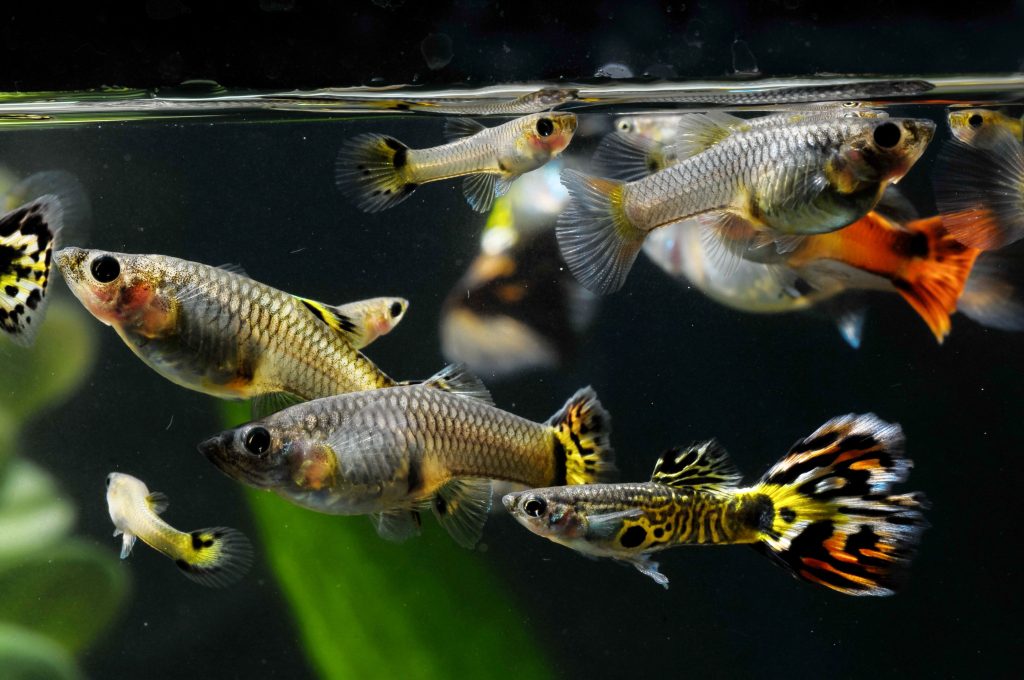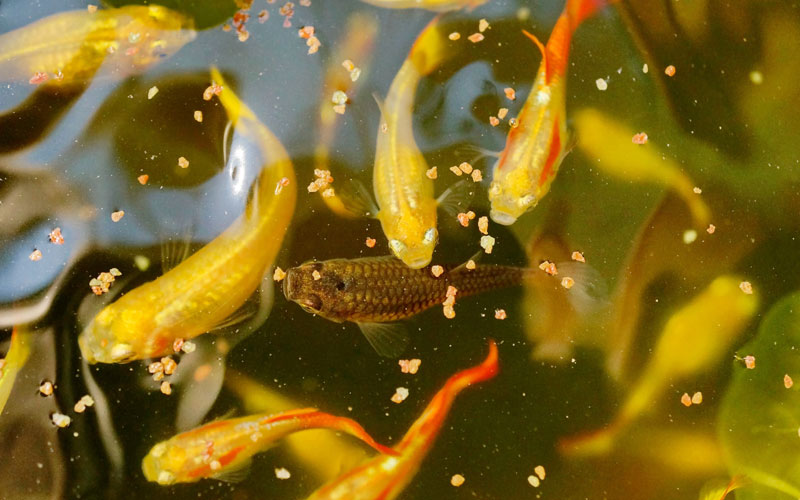How Long Can Guppies Go Without Food: Keep Fish Healthy & Active!
How long can guppies go without food? Guppy fry can go only 2-3 days, whereas adults can survive up to 2 weeks.
While you’re on vacation, a food shortage arises in the fish tank quickly. Guppy fries depend entirely on food supplies and face permanent malformation in digestion without a regular feeding schedule. But once you stop feeding, Guppy adults can survive on alternate sources like algae and small insects. Hence, these adults can manage up to 2 weeks without food.
Still confused about Guppies feeding? Scroll through our guide to maintain the proper feeding schedule and ensure healthy growth.
How Long Can Guppies Go Without Food

Depending on the life stage, guppy fry can go only 2-3 days, whereas healthy adults can survive up to 2 weeks without food.
Guppy fry and younger ones mainly depend on food supplies, unable to survive without regular feeding. In fact, the developing digestive system can’t take the disruption in feeding patterns. As a result, guppy fries face permanent malformation in digestion that leads to death.
On the other hand, healthy Guppy adults can survive on alternate sources like algae and small insects. If you’re going out for a few days, these sources help adult guppies to survive up to 2 weeks. But pregnant and sick guppies can’t survive more than a week without food because of physical issues.
How Often Do I Feed Guppies?
Due to the difference in food requirements at life stages, the feeding pattern varies from fries to adults. According to BadmanFish, Guppy fried requires 3 to 4 times of feeding whereas adult requires once a day.
While it’s about Guppy fries, the developing digestive system requires continuous food to maintain better growth and development. Until these fries reach one month, we suggest feeding Guppies at least 3 times daily to keep them healthy and active. But, after one month, reduce the feeding pattern 2-3 times daily.
Once Guppy becomes an adult, feed them once a day. Even adults use other sources like algae or small insects to meet the demand. If you’re feeding adults excessively, it can create a risk of health problems. So, always maintain the feeding pattern regularly to ensure healthy growth and avoid health issues.
How Do I Know When Guppies Are Hungry?
When Guppies are hungry, they dig at the substrate, swim to the top of the tank, and become aggressive.
If the guppies face irregular and inadequate food supply, they start digging the substrate to find food. Besides, these fish wait at the top of the aquarium while facing a lack of food and oxygen. Once guppies strive for hours, they become stressed and aggressive. As a result, these fishes move a lot from top to bottom in search of food.
Due to the aggressiveness and movements, they become inactive after a few hours. In short, irregular feeding can impact the health of these fish. Hence, it is better to feed guppies once daily to keep them active and healthy.
What Do Guppies Eat?

Guppies can eat commercial or homemade flakes, bloodworms, brine shrimp, daphnia, micro worms, vegetables, etc.
Let’s start with the dietary habit of guppy fries. These fries enjoy vegetable & meaty flakes, frozen dry foods, micro worms, brine shrimp, and egg yolk paste. It is better to feed fried multiple times to ensure healthy and quick growth. But, always feed food in small quantities for better digestion.
Adult guppies require a rich source of protein and prefer commercial fish food, fish flakes, and the homemade blend of meat with vegetables. Even these fish can eat beef hearts, egg yolk, chicken breasts, and vegetables like peas, lettuce, green beans, and mustard greens.
How To Prepare Aquarium While Going On Vacation
To prepare a fish aquarium for guppies, install an automatic feeder, use a cycled tank, add live fish food, and change the filter medium before going on vacation. Let’s go through these ways in detail.
Install An Automatic Feeder
Before going on a vacation, install an automatic fish feeder to avoid starving. These feeders can feed the fish with a set timer for months. Just fill up the chambers with guppy food right before leaving. Hence, these feeders can maintain a proper feeding schedule and avoid overfeeding.
Use Cycled Tank
Old tanks can cause a potential bacterial imbalance while on vacation, resulting in the wiping of fish. To prevent such issues, shift guppies in a cycled tank with a mature culture of nitrifying bacteria to create a safe environment. Even the regulation of the nitrogen cycle can keep your guppies safe and healthy.
Add Live Fish Food
If you give guppies a large amount of food pellet while leaving, it can cause serious health issues. Fishparlor suggests adding live food like daphnia or brine shrimp to the tank. Now, these species can live in tanks for days. As a result, guppies can enjoy fresh food when required.
Clean Or Change The Filter Media
While you’re away for weeks, fish waste and debris can clog up filters and cause an extreme build-up of toxic substances. clean or change the filter media to prevent toxin buildup on the tank. Also, change the filter media without harming the beneficial bacteria to ensure an extended run.
Change The Water
After a few weeks, the nitrate concentration becomes excessively high, causing the death of fish. To maintain the normal nitrate concentration levels, we suggest changing 50-60% of the water before leaving. It keeps the concentration below 10 ppm to keep fish safe while on vacation.
Call For A Pet Sitter
If you’re going out for a month, these ways may not work well. In such cases, it is wise to call a family member, friend, or expert in a pet setting to care for fish.
Warp Up
Guppy fry can go only 2-3 days without food, whereas adults can go up to 2 weeks. Guppy fries mainly depend on food supplies, but adults can survive on alternate sources like algae and small insects.
If you’re going out for months, it is better to install an automatic feeder, use a cycled tank or add live fish food to feed guppies and keep them healthy. Avoid overfeeding while leaving as leftover and fish waste break into ammonia & nitrites, which create health risks.
